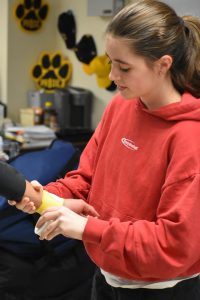To stay or not to stay
Students find importance in school involvement
February 24, 2015
Students decide what to do after the last bell
Although it is difficult to believe, U. City offers opportunities to pursue passions in athletic training, culinary artistry, interior design, and even public speaking. There are a plethora of interests that can be explored; however, many students are unaware of this fact. Students’ ignorance masks the reality of opportunity available at U. City. Junior Erinn Ward finds that students’ unawareness leads to a general disinterest in school.
“I think people hate coming to school because the class periods are too long and they think there is not anything to look forward to at school,” said Ward.
Admittedly, much of the unawareness has a lot to do with clubs not rigorously and actively recruiting members. For the most part, clubs rely on the annual club fair early in the school year to increase membership.
In addition, club membership seemingly tends to only be comprised of specific cliques. For instance, members of the National Honor Society and Latin Club tend to be very close friends. They are also generally the same group of people. Junior Rontrell Gentry finds a racial correlation.
“People feel most comfortable being around people of their own race,” Gentry said.
Nevertheless, senior Simone Foxx mentioned that there will always be a portion of the school population that will neglect extracurricular involvement. A member of the volleyball team and active participant on U. City’s culinary team, Foxx even believes that this population typically remains less involved after high school. Their inactivity might reflect in their voting habits and cultural awareness.
“I think people will refuse to get involved because of peer pressure or pure laziness,” Foxx said. “But then there is always the issue of having a ride back and forth to school.”
As a very active member of the student body, I will admit that the extracurricular activities that I am committed to typically have similar membership. Being co-captain of the varsity cheerleading team; senior class vice president; Family, Career, and Community Leaders of America (FCCLA) chapter president; and Future Business Leaders of America (FBLA) parliamentarian, I usually see the same faces in each setting. For instance, fellow student representative Gentry is also involved in FCCLA. We even mentor freshmen together. His commitment to improving the school environment is what motivates him to pursue the same activities as me. The promise of a lasting legacy is equally important.
Moreover, Gentry admits that if it was not for his school activities he probably would have been a person bent on making horrible life decisions.
“It keeps me active and out of the streets,” said Gentry. “Mainly when boredom hits people do stupid stuff.”
Similarly, I owe much of my maturation to school involvement. If it were not for my heavy involvement in school, my afternoons would begin and end with homework and sleep—not building up interpersonal or leadership skills. For me, the excitement of the day generally starts at the sound of the last bell. In fact, I am most proud of my achievements outside of the classroom.
FCCLA sponsors legislative shadowing
For instance, I recently had the opportunity to shadow Senator Jill Schupp of Missouri’s 24th district. The shadowing event was sponsored by FCCLA and allowed two members from each chapter to apply and potentially participate. From U. City’s chapter, my sister Taylor Bass, junior, and I applied. Not long after the application process, we were eventually selected to meet a legislator of Missouri. For my sister, it was Senator and University City School Board member Maria Chappelle-Nadal.
“I was excited about meeting my senator because I had the opportunity to pitch changes to her that students would enjoy,” said Taylor Bass. “For example, I wanted to emphasize the impact of having stadium lights during football season. Although citizens voted to strike it down, I am hoping that my visit would continue the fight.”
Our learning experience began Feb. 10. My sister and I accompanied FCCLA adviser Mrs. Favazza and chaperone Ms. Pritchard to Jefferson City. Along the way we toured Mizzou. Upon our arrival to Jefferson City, we toured the Governor’s Mansion and hurried to our hotel room to change for our attendance at a banquet sponsored by the Missouri Bar Association. The event was rather splendid. On the menu was chef’s salad, alfredo, lasagna, and an array of desserts, from brownies to cookies. The night eventually ended with anticipation for the events to come the following day.
Early the next morning, we entered the grand state Capitol and met the state senators we intended to shadow. The day included following the senators’ interns while they ran important errands and watching the legislators debate. On that particular day, Senator Schupp was debating Senate Bill 24, which modifies provisions of law relating to the Temporary Assistance for Needy Families program and Supplemental Nutrition Assistance Program. Being adverse to the bill’s passing, Schupp was trying to stall the process.
After the debating, Schupp treated me to lunch and I was able to get a first-hand account of the senator’s experience.
The learning experience
Overall, the shadowing experience was rather enriching. It did not convince me to pursue a career in government; however, it left me a more informed citizen. Mostly, it proved to be invaluable. How many people get to have lunch with a state senator?
While we only expect students from wealthier school districts like Ladue to be afforded such opportunities, right here at U. City they are offered every day. Often they go to the same individuals or even go unclaimed. Foxx emphasized that every student should be involved at school in some capacity.
“It’s all in the experiences and being able to say I did something with pride and had fun doing it,” Foxx said.






































